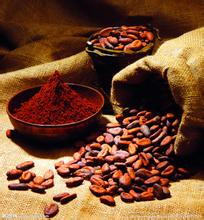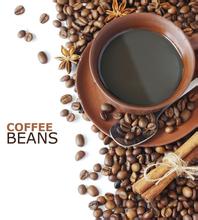Introduction to Fine Coffee beans from Manors in producing areas
Guatemalan coffee has a strong aroma, even if you don't drink it, just smelling it is already a pleasure. Antigua coffee has a rich and velvety mellow, rich and lively aroma, and fine sour taste. When the attractive fragrance lingers on the tip of your tongue, there is an indescribable mystery. You may feel dull at the first sip, but as the coffee cools down, you will find it slightly sweet and be surprised by its depth.
Antigua coffee is popular with most coffee lovers only because of its distinctive aroma. Because it is planted in the hills of volcanoes, it can retain its own characteristics more than Costa Rica, the main reason is that it has more geographical and climatic advantages than Costa Rica. Guatemala is located in the tropics, but due to the relatively high altitude, the climate is mild, it is a subtropical climate. Under the influence of this climate, coffee trees blossom and bear fruit more slowly than coffee trees in other parts of the world. However, the mild climate and fertile soil make it an excellent environment for growing coffee.
The coffee industry, run by the Mayans, once boomed Guatemala's economy and dominated the national economy. Unfortunately, the political situation in Guatemala is not good for these coffee growers. High output is usually a sign of a country's overall economic prosperity. However, coffee production in Guatemala has declined relatively, at 700kg per hectare, compared with 900kg per hectare in El Salvador and 1700 kg per hectare in Costa Rica. Guatemalan coffee exports are controlled by private companies, but the National Coffee Commission controls other sectors of the coffee industry.
At present, some of the best quality coffee from Guatemala is exported to Japan, where each cup of coffee sells for $3 to $4. In order to revitalize its coffee industry, Guatemala has specially set up a special coffee association and gives maximum funding and attention to these high-quality coffees. these efforts will soon bear fruit, and the real beneficiaries are not only coffee growers, but also coffee lovers all over the world.
A cup of Antigua coffee in Guatemala seems to let us see the sudden disappearance of the mysterious Mayans multiply in the ancient land, history brushed away their existence, history has achieved their eternity.
If a person's wrinkles depict a person's path, then the smell of coffee remembers the origin of a cup of coffee: about its hometown, the time of harvest, the way it is roasted and ground, that is, the lifetime journey of coffee. Guatemala's fertile volcanic soil gives birth to a unique flavor of boutique coffee beans: Antigua coffee. The charm of Antigua lies in its balanced and refreshing acidity, rich spice and unique smoky taste, as if to tell us about the desolate history of Antigua in Guatemala.
The aroma of coffee liberates all forms, hearts and national boundaries. Through coffee, the mood leaves the country at any time and lands in a strange country half a world away. Even at the end of the world, you can share a mood. Antigua was the capital of the Spanish colonial period in 1543. Although this emerald-like valley has been surrounded by active volcanoes in all directions, layered, deliberately waiting and full of dangers since ancient times, its vastness, vastness and fertility still tempted Spaniards to build a capital in the precarious cliff valley.
The volcano once destroyed the once-prosperous capital in an instant, robbing it of all its prosperity and beauty overnight. After this subversive mountain city, the splendor of more than 200 years has disappeared, and Antigua has never swaggered. After being dull, Antigua is now run by the last remaining Indians. These hardworking Indians became later coffee producers. They not only discovered the rich and attractive unique smell of Antigua coffee, but also brought it to people all over the world. Today, Antigua coffee enjoys a reputation as the best quality coffee in the world and is praised by coffee connoisseurs as the best and most distinctive coffee in the world.

Important Notice :
前街咖啡 FrontStreet Coffee has moved to new addredd:
FrontStreet Coffee Address: 315,Donghua East Road,GuangZhou
Tel:020 38364473
- Prev

Delicious Costa Rican Coffee Flavor Description Grind Characteristics Variety Introduction
Costa Rica's coffee industry, formerly controlled by the Instituto del Café de Costa Rica (ICAFE), has been taken over by the Official Coffee Council (Oficina del Caf). Among coffee exports, those deemed substandard are colored with blue vegetable dye before being recycled for domestic sale. Coffee consumed domestically
- Next

Introduction to the characteristics of Kilimanjaro Coffee Flavor description treatment
Kilimanjaro coffee is mainly suitable for blending, can be self-blending or made into a variety of fancy coffee. Individual production: brewing: to brew a good cup of coffee, in addition to fresh coffee powder and slightly harder water, but also a set of easy-to-use brewing tools. There are three main types of coffee machines in common use. Drip filter: wet coffee powder with water to let
Related
- Detailed explanation of Jadeite planting Land in Panamanian Jadeite Manor introduction to the grading system of Jadeite competitive bidding, Red bid, Green bid and Rose Summer
- Story of Coffee planting in Brenka region of Costa Rica Stonehenge Manor anaerobic heavy honey treatment of flavor mouth
- What's on the barrel of Blue Mountain Coffee beans?
- Can American coffee also pull flowers? How to use hot American style to pull out a good-looking pattern?
- Can you make a cold extract with coffee beans? What is the right proportion for cold-extracted coffee formula?
- Indonesian PWN Gold Mandrine Coffee Origin Features Flavor How to Chong? Mandolin coffee is American.
- A brief introduction to the flavor characteristics of Brazilian yellow bourbon coffee beans
- What is the effect of different water quality on the flavor of cold-extracted coffee? What kind of water is best for brewing coffee?
- Why do you think of Rose Summer whenever you mention Panamanian coffee?
- Introduction to the characteristics of authentic blue mountain coffee bean producing areas? What is the CIB Coffee Authority in Jamaica?

